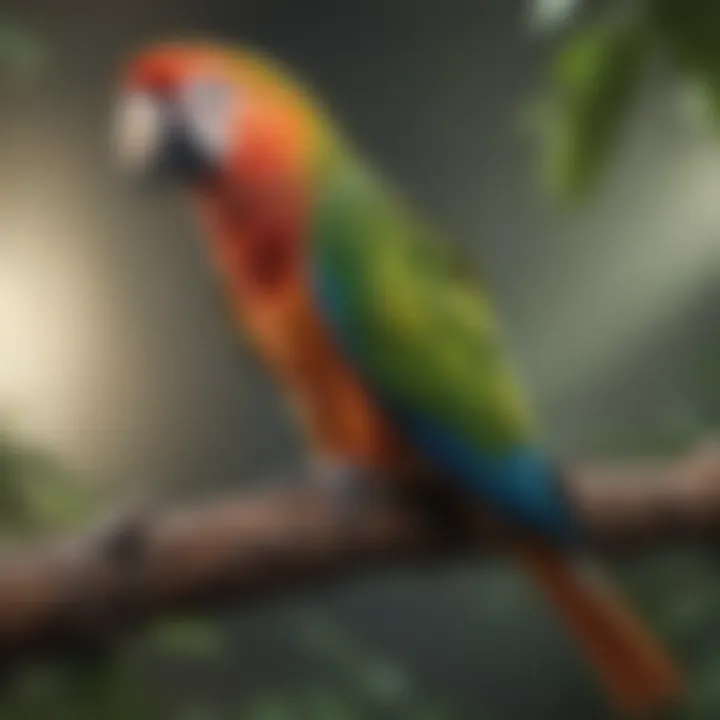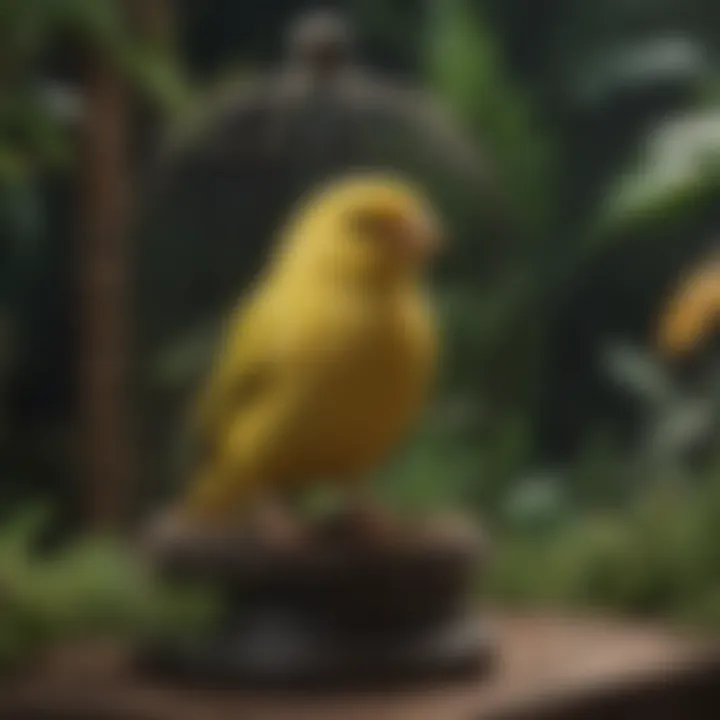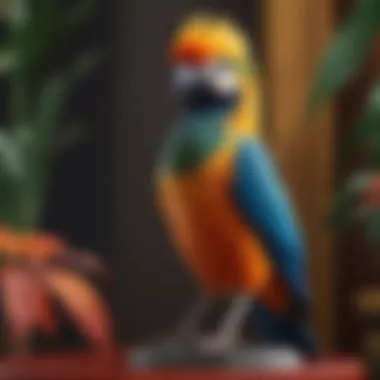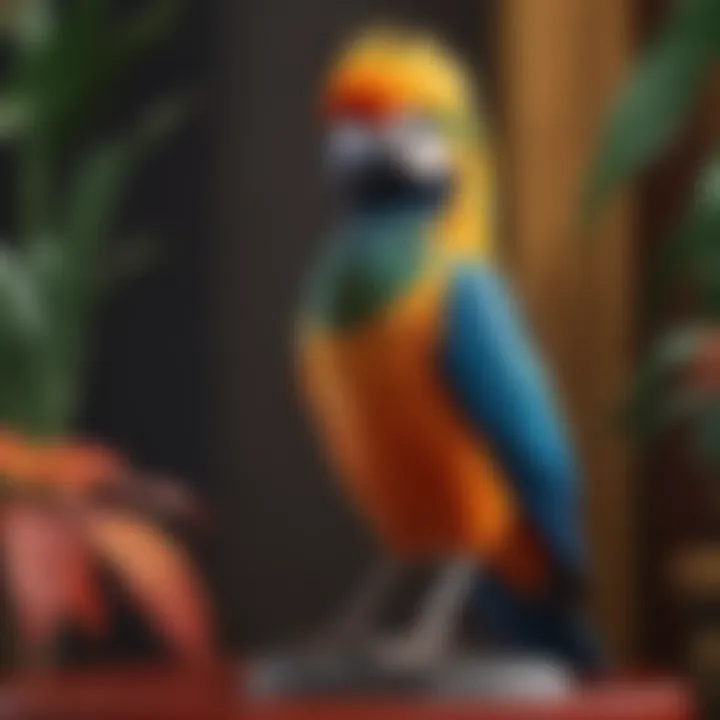Essential Care Guide for Popular Pet Birds


Intro
Keeping pet birds can be an incredibly rewarding experience. Whether you’re a first-time owner or a seasoned bird enthusiast, understanding the essential needs of your feathered companions is vital. Birds are not just lively decorations in a home; they’re complex creatures that require thoughtful and attentive care. This guide aims to illuminate the different aspects of caring for popular pet birds by covering pivotal topics such as their dietary needs, habitat requirements, training, and even emotional connections they can share with their human companions. We'll also touch on health considerations to ensure your feathery friends lead happy, fulfilling lives.
In the course of this exploration, you will discover that catering to their specific needs stems from a blend of knowledge and empathy. A well-cared-for bird can transform a house into a home and bring a burst of life and joy into your daily routine.
Avian Care Basics
Caring for birds goes beyond simply feeding them or keeping their cages clean. A comprehensive understanding of their basic needs underpins successful avian care.
Importance of Proper Nutrition
Birds have unique dietary requirements based on their species. A varied diet rich in seeds, fruits, vegetables, and specialized pellets is crucial. For instance, budgerigars thrive on a balanced mix of seeds and greens, while cockatiels can benefit from fortified pellets along with the occasional treat of fresh fruit.
- Offer a steady supply of fresh water daily.
- Provide a variety of fresh fruits like apples and berries.
- Incorporate leafy greens such as spinach and kale into their diet.
Nutrition is a cornerstone of their health that cannot be overlooked. Poor dietary choices can lead to various health issues, such as obesity and nutritional deficiencies.
Understanding Bird Species and Their Needs
Before bringing home a bird, it’s essential to familiarize yourself with its species-specific needs. Not all birds are the same. A larger macaw requires more space and social interaction compared to a small parakeet. Some might enjoy toys that challenge their intellect, while others prefer simpler items.
Key Considerations:
- Size of the bird: Larger birds need bigger cages.
- Social behavior: Some thrive on companionship, while others are more solitary.
- Lifespan: Knowing how long they live helps you prepare for the long haul.
Basics of Birds Habitat Setup
The environment in which your bird lives can greatly affect its behavior and overall well-being. A spacious cage that allows enough room for movement and play is essential.
- Use non-toxic materials for cage lining on the bottom.
- Place perches at different elevations to encourage movement.
- Ensure access to natural light while guarding against direct sun exposure.
Creating a stimulating environment with toys, perches, and places to explore can contribute significantly to reducing boredom and promoting mental health.
Grooming and Hygiene Tips
Keeping your bird clean is key to its health. Regular grooming should be part of your routine. This includes nail trims, feather care, and bathing.
- Bird baths or misting are great for keeping feathers in top shape.
- Check for any noticeable debris or dirt in the cage daily.
- Schedule regular vet visits to avoid any unnoticed issues.
Interacting with Your Pet Bird
Birds are social creatures that thrive on interaction, and building a bond with them opens the door to enriching experiences.
Building Trust and Connection
Establishing rapport with your bird takes time. Speak softly and offer treats to create a safe space for them. Patience is key; a nervous bird will not warm up quickly.
Training Techniques and Tips
Birds can learn a variety of commands and tricks, enhancing the relationship you share. Consistency and positive reinforcement are paramount when training your feathered friend.
- Use small treats as rewards.
- Keep training sessions short, around 5 to 10 minutes.
- Be patient and avoid yelling or harsh words.
Fun Activities for Bird Owners and Their Birds
Life can be quite mundane for a bird if left to its own devices. Engage them with activities that foster both mental and physical stimulation.
"A bored bird is an unhappy bird. Make sure to provide toys and activities!"
- Interactive toys that dispense treats to incite exploration.
- Hide-and-seek games that involve calling the bird to find you.
Recognizing Bird Cues and Behaviors
Interpreting your bird's body language is crucial. Tail feathers fluffed might mean they're feeling aggressive, while a relaxed stance shows contentment. Take note of these cues to adjust your behavior accordingly and foster a better relationship.
Emotional Well-Being of Birds
Birds possess emotional depth, necessitating attention beyond their physical needs. Understanding this aspect will encourage the creation of a nurturing environment.
The Role of Play and Socialization
Playtime should be as important as meal times; it fosters their emotional well-being and keeps them active. Socializing with other birds or humans can help them feel less lonely.
Enhancing Birds' Emotional Health
Introduce new and engaging activities regularly to keep their interest piqued. Rotating toys and allowing exploration outside the cage can significantly enhance their happiness.
Assessing Bird Stress and Remedies
It’s crucial to recognize signs of stress, which can manifest in many forms like feather picking or squawking excessively. Guaranteeing a calm environment, crucial hiding spots, and interaction can alleviate their anxiety.
Building Strong Human-Bird Bonds
The bond between a bird and its owner is intricate yet rewarding. Investing time in building trust is particularly vital in nurturing this connection.
Bird Health and Safety
Maintaining your bird's health is perhaps the most significant aspect of care. Birds are often good at hiding illnesses, so proactive care is essential.
Common Health Issues and Prevention
Some prevalent problems birds face include respiratory infections and feather conditions. Regular vet check-ups can help catch these ailments early on.
Routine Veterinary Care
Annual vet visits should be a part of your routine. A vet specialized in avian medicine can provide insights on preventative health measures specific to your bird.
Environmental Hazards to Avoid
Certain plants, fumes from cooking or cleaning products, and even ceiling fans can pose threats to your pet bird's health.
Signs of Illness or Distress
Pay attention to changes in behavior, such as decreased eating or unusual droppings. These signs often serve as red flags that require immediate attention.


Fun Facts and Quirky Insights
Understanding the charm of different bird species can add a fun twist to your bird-keeping journey.
Unique Traits of Popular Bird Species
Each bird species is distinctive in its way, from vibrant plumage to fascinating vocalizations.
Historical and Cultural Significance of Birds
Birds have played vital roles in various cultures, symbolizing freedom, love, and companionship throughout history.
Famous Bird Owners and Their Stories
Many celebrities have harbored a love for birds. Stories of these relationships often reveal how meaningful these connections can be, encouraging more people to consider avian companions in their lives.
Equipping oneself with knowledge empowers bird owners to offer a life filled with joy and care for their feathered friends. The insights shared here guide you to navigate the world of pet birds, ensuring your bird thrives not just as a pet but as a cherished member of your household.
Preamble to Pet Birds
Birds can be delightful companions, bringing both joy and challenges to the lives of their owners. Choosing to have a bird as a pet isn't just about picking a cute feathered friend, but it involves understanding their unique needs, personalities, and quirks. This segment lays the groundwork for understanding bird ownership, emphasizing its importance in creating a fulfilling relationship with these creatures.
Understanding Bird Ownership
Owning a bird comes with its own set of responsibilities. Unlike cats or dogs, birds require special care that involves not just their basic needs of food and shelter, but also their emotional and social requirements. When one opts to bring a bird into their home, it’s crucial to appreciate that these lively creatures often thrive on social interaction, both with humans and their avian counterparts.
Additionally, each species of bird has distinct needs and characteristics. For instance, some birds are known for their intelligence and vocal abilities, while others might be more reserved or gentle in nature. Understanding these differences can lead to more informed decisions, ultimately enhancing the bird's well-being and the owner’s satisfaction.
Popular Bird Species
Parrots
Parrots stand out for their vibrant personalities and their ability to mimic sounds. This unique feature, along with their intelligence, makes them a popular choice among bird enthusiasts. Many pet owners are drawn to the idea of a chatty companion that can engage in playful banter. However, potential owners should recognize that parrots are highly social animals, requiring regular interaction and mental stimulation. Neglecting this aspect can lead to behavioral issues, making them more demanding than one might initially expect.
Canaries
Canaries are often favored for their beautiful songs and relatively low maintenance. They tend to be more independent compared to parrots, making them ideal for owners who may not have extensive time to dedicate to direct interaction. Their vibrant colors and melodic tunefulness bring a certain charm to any home setting. However, despite their independence, they still require attention and care, particularly in ensuring a spacious cage and a proper diet. Also, they can sometimes be sensitive to changes in environment.
African Grey
The African Grey is often described as the genius of the avian world, known for its exceptional cognitive abilities and vocal prowess. Their ability to learn, along with their deep emotional connections, makes them sought-after companions. That being said, their intelligence demands extensive mental stimulation; otherwise, they can become bored, which may lead to destructive behavior. They thrive best in environments where they can be part of the family’s daily routine.
Cockatiels
Cockatiels are one of the friendliest and most sociable bird species available. They’re remarkable for their affectionate nature and relatively easy care requirements. These birds love to interact with their owners and can display delight through a range of vocalizations and social behaviors. While they are generally adaptable, providing them with plenty of toys and activities can keep them from becoming bored or anxious. Ensuring a safe space and engaging interaction can cultivate a happy and healthy life for cockatiels.
"Birds are a reminder that life can be free-spirited and joyous, yet requires attentiveness and love."
Choosing the Right Pet Bird
Selecting the ideal pet bird is a significant decision that can greatly influence your experience as a bird owner. It's not just about picking a cute face; it's about understanding how that bird will fit into your life. Each bird species has its quirks, needs, and personalities. Hence, diving deep into the various aspects of bird ownership can ensure both you and your avian companion live happily together.
Assessing Your Lifestyle
Before rushing into deciding on which feathered friend to bring home, take a step back and assess your current lifestyle. Ask yourself questions like:
- How much time can you dedicate daily? Birds require not just food and water but also social interaction and mental stimulation.
- Do you have other pets? Some birds can coexist with other animals, while others might be more territorial.
- Are you at home frequently? Certain species might develop anxiety without ample social interaction.
Consider your daily routine and how a bird fits within it. For instance, if you work long hours, a parrot may not be suitable as they thrive on interaction and can become bored or depressed. On the flip side, canaries or finches can be more independent, requiring less direct attention. The crux is, recognizing your availability will help ensure a bird truly integrates into your life.
Bird Personality and Compatibility
Birds are as individual as people. Their personalities range from social butterflies to serene observers. Do you prefer a lively companion that will chatter away, or are you seeking a more laid-back character?
- Parrots: Known for their intelligence and sociable nature, parrots require constant mental stimulation and can even learn to mimic your speech. They bond tightly with their owners, which means they'll want ample time with you.
- Cockatiels: These birds offer a delightful mix of personality and charm, often forming strong bonds with their owners, while also being relatively easy to care for.
- Canaries: Generally more independent, canaries are quieter but still offer beauty and song to your home.
It's essential to remember that education about a bird’s personality will enhance your bond. Selecting a bird that fits your temperament can be the difference between joy and frustration.
Considering Space Requirements
Evaluating your living space is crucial when choosing a pet bird. Not all birds require the same amount of room, and providing adequate living conditions is paramount for their well-being.
- Cage Size: Larger birds like macaws need spacious cages, while smaller species like finches or budgies can thrive in less expansive quarters.
- Flight Space: Aside from cage dimensions, consider the room for them to fly. Birds are naturally inclined to fly, so allowing them regular flight time in a safe area is important.
- Environmental Hazards: Ensure that the area is free of hazards, such as open windows or toxic houseplants.
Your birds' comfort is tied closely to their environment. Ensuring they have enough space to move around, play, and fly can help keep their spirits high and their stress levels low.
Setting Up Your Bird's Habitat
Creating a suitable habitat for your pet bird is akin to building a safe haven. The right enclosure and environment directly impact your bird’s happiness and health. This section focuses on key aspects of setting up your bird's habitat, ensuring a harmonious living space that caters to their needs and behaviors. A well-thought-out habitat promotes not only physical well-being but also psychological wellness, allowing your feathered friend to thrive in your home.
Cage Selection
When it comes to cage selection, size matters like no other factor. A spacious cage allows your bird to stretch its wings and move about comfortably. For smaller birds like canaries or finches, a cage that is at least 24 inches by 18 inches can be suitable. However, if you're raising a larger species like African Grey, opt for something bigger—think about 36 inches by 24 inches at a minimum. Ventilation is another critical element; ensure the cage allows for ample air circulation while being sturdy enough to prevent escapes. Look for cages made of non-toxic materials and avoid those with lead or zinc finishes.
Essential Accessories
Perches
Perches are critical in your bird's habitat, serving as their primary resting spots. A key characteristic of perches is that they offer your bird a place to stand, helping maintain their foot health. Using a variety of perch sizes and materials, such as natural wood, enhances foot stimulation, as it prevents conditions like bumblefoot. Additionally, making your perches easy to clean will help maintain a hygienic environment. One notable fact about perches is that birds enjoy shifting between different styles—some prefer rough textures while others like smooth surfaces. Remember, variety is the spice of life.
Toys
Toys are not merely fun objects; they play a crucial role in keeping your bird mentally stimulated. By introducing interactive and chewable toys, you help prevent boredom and destructive behaviors. A popular type of toy includes foraging toys, which mimic natural behaviors and encourage problem-solving. Opt for toys made with safe materials like untreated wood or sisal rope. The unique feature of toys lies in their ability to provide both entertainment and enrichment; just ensure they suit your bird's size and chewing strength. An oversight here could lead to toys breaking, posing a hazard.
Food and Water Bowls
Food and water bowls are essentials in your bird’s habitat. Look for bowls that are easy to clean and refill, as maintaining fresh food and clean water is non-negotiable for their health. One of the most beneficial aspects of well-chosen bowls is that they help prevent spills and contamination in the cage. Opting for stainless steel or ceramic bowls is often a good idea; these materials are naturally resistant to bacteria and easy to keep clean. Keep in mind that depending on the species of your bird, the size and depth of bowls may vary. A shallow bowl might be ideal for smaller birds while deeper options work best for larger species.
Creating a Safe Environment
Safety is paramount when setting up your bird's habitat. Think about potential dangers in your home, such as open windows or exposed electrical cords. To mitigate hazards, consider using screens or close windows when your bird is out of its cage. Remove any toxic plants or unfiltered household cleaners from the area, making the habitat as safe as possible. Keeping your bird’s living area relatively quiet can also help reduce stress, allowing them to feel secure. The psychological aspect of a secure environment often gets overlooked, yet it's a fundamental piece of their overall well-being.
"An adequately set up habitat is like a well-tended garden; it flourishes with care."
In summary, setting up your bird's habitat involves careful planning and consideration of various elements such as cage size, accessories, and safety measures. A harmonious environment tailored to your bird's specific needs is crucial for fostering a joyful living space.


Nutrition for Pet Birds
Nutrition plays a monumental role in the health and vitality of pet birds. It is not merely about filling a bowl with seed; it requires a thoughtful approach. Birds thrive on a balanced diet that mirrors their natural foraging behavior in the wild. A properly nourished bird exhibits vibrant feathers, lively antics, and an overall better quality of life. Neglecting proper nutrition can lead to a slew of health issues, from obesity to chronic illnesses. Thus, it's crucial to understand what constitutes a suitable diet for your avian friend.
Understanding Bird Diets
Birds have eclectic dietary needs that can differ dramatically based on their species. For instance, while some species may flourish on a predominantly seed-based diet, others require a more varied assortment of foods. Typically, birds need a mix of grains, seeds, nuts, fruits, and vegetables. Each component provides essential minerals, vitamins, and energy necessary for your bird’s well-being.
When considering bird diets, one must not overlook the importance of variety. A monotonous diet can lead to nutritional deficiencies. You should constantly adjust their meals to include different types of food. Remember, in the wild, birds often escape from predators while simultaneously foraging, which indicates their need for regular activity and mental stimulation. 🐦
Choosing the Right Bird Food
Finding the right food for your pet bird isn't just about grabbing the first option at a pet store. The decision must be informed, balanced, and species-specific. Two common types of bird food are seeds and pellets, both having their own advantages and disadvantages.
Seeds vs. Pellets
The debate between seeds and pellets can be tricky. Seeds are loved by many birds for their taste. However, they often lack certain nutrients that are essential for a balanced diet. On the other hand, pellets are designed to provide complete nutrition, combining all necessary vitamins and minerals. Birds who eat pellets generally have a lower risk of obesity and related issues.
When researching this, it becomes clear that pellets can be a beneficial choice. Make sure to pick high-quality pellets that are fortified with vitamins and minerals to offer your bird what it truly needs. Including both in moderation might be the answer, allowing them to enjoy the familiar seed while ensuring a broader nutritional intake.
Fresh Fruits and Vegetables
Adding fresh fruits and vegetables into your bird's diet is like receiving a gift that keeps on giving. These additions not only provide crucial vitamins but also bring in moisture, which is often lacking in packaged foods. Fruits like apples, bananas, and berries are excellent choices, while greens such as kale and spinach also boost their health.
The unique feature of fresh produce lies in the enhancement of taste and texture, making meals appealing. However, caution must be taken: some fruits and vegetables, like avocado, can be toxic to certain species, so always double-check before serving.
Supplements and Treats
In addition to the basics, supplements can play an important role in your bird's diet. Certain breeds may require extra calcium, protein, or other minerals, especially during breeding or molting seasons. When used appropriately, supplements can help in maintaining robust health.
Treats are also pivotal but shouldn’t dominate the diet. Think of them as the sprinkles on the cupcake – a delightful addition that can come in the forms of nuts or specific fruits. Just keep in mind, moderation is key here, as overindulging can lead to health problems.
Ultimately, developing a keen understanding of your pet bird's nutritional needs and habits leads to healthier and happier birds.
"A well-fed bird is a happy bird."
Ensuring your bird receives a nutritious diet will not only promote their longevity but also deepen your bond with your feathered friend.
Establishing a Routine
Establishing a structured routine is crucial in the care of pet birds, much like it is for any other aspect of pet ownership. Birds thrive on consistency. A daily routine helps to not only secure the birds’ physical health but also caters to their emotional well-being. They often find comfort in the predictability of their daily interactions, feeding times, and play sessions.
Daily Care Practices
Daily care practices might sound mundane, but they lay the groundwork for a happy bird. First and foremost, feeding should occur at the same times every day. For example, birds tend to enjoy a mix of foods, which can include seeds, pellets, and fresh fruits. Establishing a timetable for meals helps regulate their digestion and promotes better nutrition. A good starting point for many owners is feeding their birds in the morning and evening.
Next, cleaning routines are just as important. Daily spot-cleaning of the cage should be a no-brainer. Removing any soiled bedding or uneaten food not only keeps the environment hygienic but also helps prevent unwanted pests. Setting aside time each week for a more thorough clean-up is advisable to ensure that no corners are left untouched.
Birds also need mental stimulation. Engaging with them regularly through play, whether that involves their favorite toys or brief training sessions, helps keep their minds sharp. Schedule about 15 to 30 minutes of playtime daily, and you’ll notice your feathered friend exhibiting more joy and curiosity.
"A daily routine does more than just organize the day; it nurtures the bond between bird and owner, creating a life of harmony and connection."
Importance of Social Interaction
Birds are social creatures. Being solitary can lead to stress and health issues in birds, so integrating a focus on social interaction into your routine is paramount. Owners should dedicate specific periods of the day for interacting with their birds—this doesn’t need to be lengthy but should be consistent.
Consider talking to your bird casually like it is a friend; even though they may not understand every word, the tone of your voice and your attention can work wonders. Spending time simply sitting with them can be just as significant.
Additionally, ensuring they meet and interact with other birds can elevate their social experiences, especially if they bond with another pet bird. However, this should be done cautiously to ensure they are well-acquainted.
In summary, establishing a routine focusing on daily care and social interaction sets the stage for a healthy, happy pet bird. By creating a structured environment enriched with consistent interaction, you deepen the bond and promote a thriving avian companion.
Health and Well-being
When it comes to owning a pet bird, ensuring the health and well-being of your feathered friend cannot be overstated. A vibrant and lively bird is not only a pleasure to observe but it also indicates that you’re doing a good job as a bird parent. A strong focus on health fosters not only a longer life for your avian companion but also enhances the bond between you and your bird, nurturing a happy atmosphere at home. The significance of health management intertwines deeply with the everyday lives of pet birds, affecting their mood, behavior, and overall quality of life.
Common Health Issues
Understanding common health issues that can affect pet birds is crucial for any bird owner. Birds, similar to humans, can experience a range of ailments, some of which can be quite subtle and easily overlooked. Here are a few prevalent health issues:
- Obesity: This is a silent killer for many birds especially those that are not allowed ample flight time. An unbalanced diet can lead to weight gain, decreasing mobility and causing other serious health concerns.
- Respiratory Problems: Birds are susceptible to respiratory diseases which can arise from environmental factors like poor ventilation or exposure to harmful fumes from cooking.
- Feather Plucking and Other Behavior Issues: Stress, boredom, or illness can lead birds to pluck their feathers, often resulting in a cycle of self-destructive behavior.
- Gastrointestinal Disorders: Digestive issues can manifest in various forms, often caused by fluctuations in diet or stress.
Recognizing these issues requires vigilance and a good eye. Regular health checks, close monitoring of behavior, and an awareness of changes in eating habits are indispensable in catching these issues early.
Veterinary Care
Routine veterinary care is paramount in maintaining a pet bird’s health. Taking your bird to an avian vet is a key part of responsible bird ownership. Here are a few essential aspects regarding veterinary visits:
- Annual Check-ups: These appointments help catch any hidden health problems. An avian vet will check their feathers, beak, and feet, as well as assess weight and overall behavior.
- Vaccinations: Like many pets, birds can benefit from vaccinations, which offer protection against common diseases. Consult your vet on what is suitable for your specific type of bird.
- Dental Care: While birds might not have traditional teeth, their beaks require care as well. Regular examinations can prevent issues that arise from improper beak alignment or overgrown beaks.
Veterinary knowledge about different species can greatly impact health outcomes. Therefore, always seek a veterinarian specializing in avian care when possible.
Signs of Stress or Illness
Being able to identify signs of stress or illness is essential for any bird owner. Birds can be masters at hiding their discomfort, often masking signs until the condition worsens. Here are a few indicators that might signal your bird is unwell:
- Changes in Appetite: A sudden decrease or increase in food intake might indicate stress or illness.
- Altered Behavior: If a previously social bird becomes withdrawn or aggressive, it’s time to investigate.
- Physical Symptoms: Look out for signs like lethargy, ruffled feathers, or a change in vocalization. Also be aware of any unusual droppings—because these can tell you a lot about your bird’s health.
- Excessive Grooming: If your bird is spending too much time grooming itself, it might be an indication of stress or skin irritations.
Regular observation and being in tune with your bird’s behavior can make a world of difference in catching health issues and ensuring a thriving pet bird environment.
Recognizing these signs not only translates to better health but also strengthens the bond you share with your bird, making your role as a caregiver both rewarding and insightful.
Behavioral Insights
Understanding the behavioral insights of pet birds is crucial for creating a thriving, harmonious environment for our feathered friends. Birds, like any other pets, exhibit a range of behaviors that stem from their innate instincts and social structures. By comprehending these behaviors, owners can better cater to their pets' needs, making it easier to bond with them and ensure their well-being.
Grasping bird behaviors is not merely about observing; it’s about interpreting the subtleties in those actions. Recognizing when a bird is showing signs of stress, excitement, or comfort can dramatically affect care routines. This understanding helps minimize potential issues and builds trust between you and your bird—an essential factor in their emotional health and overall happiness.
Understanding Bird Body Language
Birds communicate largely through body language, and it's imperative for owners to tune into these signals. For instance, a bird that fluffs its feathers may feel insecure or cold, while an excited bird might puff itself up and chatter energetically. By paying attention to such cues, pet owners can respond appropriately to their birds’ needs.
One common behavior to watch for is the head-bobbing motion. This can indicate various feelings, such as curiosity, excitement, or even a call for attention. Conversely, if a bird is seen crouching or hiding, it could be feeling threatened. By reading these signs, owners can better support their birds in stressful situations and nurture a secure environment.
Training Techniques


Training pet birds is not just about teaching tricks; it's fundamentally about fostering communication and understanding. Birds are intelligent creatures and require mental stimulation to stay happy. Positive reinforcement is often the most effective training method. Offering rewards—such as treats or verbal praise—for good behavior encourages birds to repeat those actions.
Additionally, short and consistent training sessions can greatly enhance focus and learning retention. Birds have attention spans that can wane quickly, similar to young children. Keeping training engaging and fun is key to success. Also, involving different family members in the process helps your bird feel comfortable with multiple voices and interactions, leading to a more enriched life.
Enrichment Activities
Interactive Toys
Interactive toys hold a prominent place in the lives of pet birds. These toys do more than just entertain; they engage birds mentally and physically, which is vital for their well-being. A good interactive toy often involves puzzles or challenges that stimulate cognitive abilities. For instance, a toy that dispenses treats when a bird figures out how to manipulate it can keep them occupied for hours.
What makes these toys particularly appealing is their ability to cater to a range of bird personalities. Whether your bird is particularly intelligent like an African Grey or more laid-back like a cockatiel, there are toys designed to suit different temperaments. However, it's essential to monitor how your bird interacts with the toys, ensuring they do not become frustrated or bored.
Advantages of using interactive toys include enhanced problem-solving skills and reduced boredom, which can often lead to negative behaviors such as feather plucking. On the flip side, some birds may take to certain toys while others may not show much interest. Experimentation becomes important here—finding the best fit for your bird’s play style.
Flight Time
Speaking of engaging activities, providing ample flight time is paramount for nurturing a bird’s physical and mental health. Allowing birds to spread their wings not only aids in developing muscle strength but also satisfies their instinctual need to fly. Regular flight time improves cardiovascular health and contributes to overall happiness.
The notable characteristic of flight time is that it lets birds explore their space—offering them autonomy. It's heartening to witness a bird soar across the room, navigating through obstacles with agility. Owners can structure safe environments that allow for free flight, while still being mindful of perils like windows or ceiling fans.
However, it's vital to supervise birds during these flights. Not all homes are bird-proof, and risks must be managed. Still, when facilitated correctly, the benefits far outweigh the drawbacks, presenting a thrilling experience for both birds and their owners.
"Birds are our companions who share their world with us—a world needlessly complex without understanding them."
Visualizing your pet bird thriving in its own habitat underscores the importance of understanding behavioral insights. Whether it’s through effective training or enriching activities, the journey is about creating a lasting bond that enhances both your lives.
Creating Emotional Connections
Building a bond with your pet bird goes beyond the basics of feeding and housing. Emotional connections are vital for both you and your bird. A strong relationship can lead to happier, healthier lives for both. A bird thriving in a loving environment is often more sociable and less prone to stress-related issues.
Creating these connections involves understanding your parrot's, canary's or cockatiel's unique personality. Each species has its traits, and even individual birds within a species can vary widely in how they respond to humans. Spending quality time, engaging in gentle interactions, and observing their behaviors play pivotal roles in fostering this bond.
Bonding with Your Bird
To bond effectively with your bird, consistency is key. Routine creates a sense of security. Begin by establishing specific times for handling and play. For instance, set aside ten minutes daily to talk softly or sing to your feathered friend. This simple act can reinforce trust. Moreover, mimicking some of your bird’s sounds may lead to an interesting back-and-forth interaction.
In addition to vocal communication, physical contact is essential. Gentle petting—if your bird enjoys it—can strengthen your relationship. Ensure that you approach your bird calmly. If it seems nervous, give it space. Each interaction should be positive. Birds are sensitive; a negative experience could set back progress.
- Toys and Enrichment: Engaging toys help hold your bird's attention and encourage exploration. Rotating toys can keep things fresh and stimulating.
- Training Sessions: Basic tricks or even simple commands can be beneficial for bonding. Involve treats as positive reinforcement to motivate your bird.
"A bird's heart beats faster when it senses love; that is the rhythm of a happy home."
Recognizing Emotional Needs
Just like humans, birds have emotional needs that must be addressed. Observing your bird's behavior can give you insights into what it might need. Are they excited and chirping, or are they quiet and withdrawn? Recognizing these signs is crucial. If your bird is displaying signs of distress, such as feather-plucking or excessive screeching, it may feel lonely or bored.
Offering companionship is one way to meet this need. Birds are social animals; they thrive on interaction not just with humans but often with other birds too. If feasible, consider bringing in a compatible friend for your avian companion. However, always assess the compatibility of the new bird to prevent conflicts.
Don't forget about environmental enrichment. Items like swings or climbing structures can provide physical stimulation. Changing scenery is also beneficial; provide new perches or different views by adjusting the cage setup occasionally.
In summary, establishing and nurturing emotional connections with your pet bird can result in a stable, happy environment that enhances the joy of bird ownership. By being attuned to their needs and engaging in regular, meaningful interactions, you create a thriving bond that benefits both of you.
Traveling with Pet Birds
Traveling with your feathered friend is no small feat. Understanding how to prepare and navigate the journey ensures not only safety but also comfort for both you and your bird. Every outing could be a potential adventure, but certain strategies can help you manage the unpredictabilities that may arise. This section will outline the essentials of traveling with pet birds, focusing on preparation and the right gear necessary to keep your bird secure and stress-free.
Preparing for Travel
Before you even think about setting foot outside with your bird, preparation is key. A well-planned trip can alleviate much of the stress both for you and your avian companion. Here are some steps to consider:
- Consult Your Vet: Make a visit to the veterinarian prior to any trips. They can give you a clean bill of health for your bird and may even provide health certificates if needed.
- Familiarize Your Bird with the Carrier: Make sure to introduce your bird to its travel carrier a few days before your departure. This can help them feel more comfortable. Place treats or toys inside to encourage exploration.
- Plan for Feeding: Birds can be sensitive to changes in their routine. Keeping their feeding schedule as consistent as possible is crucial. You might want to pack their regular food to avoid any tummy troubles.
- Choose the Right Timing: If you’re traveling by car, consider leaving early in the morning or late in the evening when the sun is less intense. For air travel, try to book direct flights and avoid busy travel times.
"Preparation is the key to a smooth travel experience. Remember, a little groundwork goes a long way in keeping your pet relaxed and happy."
Choosing Travel Gear
The right equipment can make all the difference when traveling with your bird. Whether it's an impending road trip or a quick flight, having suitable travel gear is paramount. Here are some essentials to keep in mind:
- Travel Carrier: This should be sturdy and well-ventilated. Look for one specifically designed to keep birds safe during travels. Some may even come with secure food and water containers.
- Safety Harness: If you're going to be outside or anywhere less controlled, consider investing in a bird harness. This allows your bird to enjoy fresh air and sunshine while remaining secure.
- Portable Water Bottle: Staying hydrated is crucial, especially on longer trips. A portable water bottle can make this process easier and reduce spilling.
- Toys for Entertainment: Pack a few small toys or chewing items to keep your bird entertained during the journey. Boredom can lead to stress, which you want to avoid at all costs.
- Travel First-Aid Kit: Just in case of emergencies, having a first-aid kit tailored for birds may prove beneficial. Include essentials like antiseptic wipes, a soft cloth, and any necessary medications.
Navigating the world with your pet bird doesn’t have to be daunting. With the right preparation and equipment, you can create a more enjoyable experience for both you and your companion.
Caring for Specific Species
Caring for specific species of pet birds is not just a box-checking exercise; it's an essential part of being a responsible bird owner. Each species comes with its own set of needs, behaviors, and unique characteristics that shape its care. By understanding these specifics, pet owners can create a more enriched environment that supports the well-being and happiness of their avian companions. Tailoring care to the needs of individual birds reduces the chance of behavioral issues and health problems, fostering a deeper bond between bird and owner.
Special Needs of Parrots
Parrots are vibrant characters full of personality, but they require specialized care to thrive. These birds are renowned for their intelligence and sociability. So, providing mental stimulation is key. They need activities that challenge their minds, such as puzzles and toys that facilitate problem-solving.
Moreover, parrots have very specific dietary requirements. A diet solely based on seeds is a big no-no—it lacks nutritional balance. Instead, a mix of high-quality pellets, fresh fruits, and vegetables should be offered. For example, broccoli, carrots, and apples are favorites among many species. Ensure that any treats are given sparingly; too many can lead to obesity.
Another critical aspect of caring for parrots is their need for social interaction. These birds are social creatures and often become lonely when left alone for hours on end. Talking or even playing with them for part of the day transforms their mood significantly. Setting aside dedicated time for training and socialization helps in building trust and affection.
You might need to pay attention to their particular health risks as well. Agitation manifests differently in parrots. They can show signs of stress by becoming quiet or excessively plucking their feathers. Regular vet check-ups are essential to ensure they remain in good health
Unique Care for Canaries
Canaries may be small, but don’t let their size fool you—they require thoughtful care that caters specifically to their nature. Unlike parrots, canaries are generally less social and are often known for their beautiful singing. However, this does not mean they don’t appreciate companionship. Keeping them in pairs can stimulate their social needs without overwhelming them.
Their dietary needs, while somewhat simpler than parrots, are still essential. A high-quality seed mix is important, but include occasional greens such as spinach or dandelion greens for variety. It’s crucial to monitor their weight and condition closely; canaries are prone to obesity.
Canaries’ habitats should be spacious enough to allow for short flights. A cage that’s too small can lead to frustration and health risks. Many owners choose to allow them some flight time outside the cage, but be sure to bird-proof the area to keep them safe.
Most importantly, listen to their songs! A singing canary is typically a happy canary. Changes in the frequency or tone of their song can indicate stress or illness, serving as an early warning signal to their owners.
"Regular attention to a canary's environment, diet, and health can create a happy little ball of feathers that fills your space with music and joy."
By focusing on the unique needs of both parrots and canaries, owners can create a thriving environment that fosters joy and health for their feathered friends. Whether you are a newcomer or an experienced bird enthusiast, understanding the specific care required for each species makes a lasting difference.
End
Caring for pet birds is not just a hobby; it’s a commitment that brings with it great responsibility and rewarding experiences. Summarizing the core principles of bird care is essential because it encapsulates the knowledge that contributes to a healthy, happy avian companion. When you take the time to understand the specific needs of your pet bird, you create an environment that fosters their well-being and strengthens your bond.
Recap of Essential Care Principles
To ensure your feathered friends thrive, revisit these key care principles:
- Species-Specific Needs: Different birds have distinct requirements. For instance, while parrots may enjoy interactive toys and social activities, canaries might favor a quieter environment. Tailoring care to each bird’s unique nature is crucial.
- Balanced Diet: Offering a varied diet that includes seeds, pellets, and fresh fruits is important. Each ingredient plays a role in providing essential nutrients, so mixing it up can prevent dietary deficiencies.
- Safe and Spacious Habitat: Bird cages should provide adequate space for movement and activities. Remember to include perches at various heights and different textures. The right setup makes a world of difference.
- Regular Social Interaction: Birds are social creatures by nature, and spending time with them strengthens the bond. Try to engage with your bird daily to meet their emotional needs.
- Preventive Health Care: Routine check-ups with an avian veterinarian can catch issues before they escalate. Staying proactive about health can prevent unnecessary suffering for your bird.
Incorporating these principles into your daily routine not only enhances the quality of life for your feathered companion but also enriches your own experiences as a bird owner. Remember, the road to becoming a knowledgeable caregiver is continuous, requiring love, attention, and a willingness to learn. > "Birds may be small, but their spirit can fill a home like no other."















